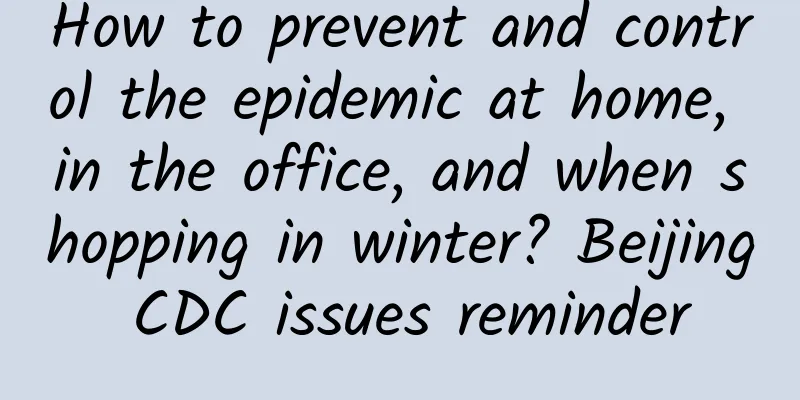How to prevent and control the epidemic at home, in the office, and when shopping in winter? Beijing CDC issues reminder

|
Recently, local cases of COVID-19 have appeared in many places, and personal protection against the epidemic has received widespread attention. So, how should we clean and disinfect at home, in the office, when going out, and when shopping to prevent the spread of the epidemic? Beijing CDC has issued a reminder for everyone: Home 1. Ventilate frequently. Depending on the specific weather conditions, ventilate 2 to 3 times a day, each time for no less than half an hour, and keep warm when ventilating. 2. Wash your hands frequently. Be sure to wash your hands when you go out and come home. Wash your hands or use hand sanitizer after touching items that may be contaminated. 3. Change and wash clothes. Change and wash clothes frequently when going out. If necessary, you can sterilize them by boiling them in boiling water or soaking them in 84 disinfectants (follow the product instructions for use). 4. Keep household surfaces clean. Door handles, telephones, desktops and other surfaces that are frequently touched by hands should be cleaned every day. If necessary (such as when guests visit your home), you can wipe and disinfect them with alcohol or 84 disinfectant (use according to the product instructions). 5. Disinfect tableware: Put the tableware that needs to be disinfected in a special pot and boil it for more than 15 minutes. 6. Take good care of oral and nasal secretions. When family members cough or sneeze, they should cover their mouths and noses with tissues; used tissues and other garbage should be placed in a separate garbage bag and disposed of in a timely manner; family members should avoid contact with tissues with secretions. 7. Precautions for home disinfection. To prevent respiratory infectious diseases such as COVID-19 and influenza, appropriate disinfection should be performed and excessive disinfection should be avoided. Office Space 1. Employees with fever or respiratory symptoms, especially those who have had close contact with patients with respiratory infectious diseases recently, should seek medical treatment in time and not go to work while sick. 2. Be familiar with various prevention measures for infectious diseases such as COVID-19 and comply with relevant regulations. 3. Pay attention to hand hygiene. Do not touch your mouth, eyes, or nose before cleaning your hands; wash your hands or use hand sanitizer before and after touching public items or other potentially contaminated items, and before and after eating. 4. Follow respiratory hygiene/cough etiquette, cover your mouth and nose with your elbow or tissue when coughing or sneezing; do not spit anywhere, wrap oral and nasal secretions with a tissue and discard them in the trash can. 5. Maintain a social distance of more than 1 meter from others. 6. Keep the office air well-circulated. When ventilating, open the windows first and use natural ventilation. If conditions permit, use exhaust fans and other exhaust devices to enhance indoor air circulation. Ensure that the central air conditioning ventilation system, elevator ventilation fans and underground garage ventilation systems are operating normally. 7. The company should provide employees with hand sanitizer at the hand-washing area, ensure the normal use of faucets and other facilities, and keep the restroom clean and dry. 8. Keep the office area clean and sanitary. Preventively disinfect public items and areas that employees frequently touch, such as desks, computers, door handles, faucets, handrails, etc., and clean up garbage in a timely manner. 9. Post knowledge on the prevention and control of infectious diseases such as COVID-19 and related health tips in conspicuous locations in public areas of the office, use display screens and other means to carry out health education, and enhance employees' awareness and ability of prevention and control. 10. The company prepares an appropriate amount of masks, thermometers, iodine tincture and other sanitary protection supplies for employees who are unwell, and assists them in seeking medical treatment in a timely manner. Bus/Subway 1. People with fever or respiratory symptoms, especially those who have had close contact with patients with respiratory infectious diseases recently, should try not to take public transportation and wear a mask if they need to travel. 2. Pay attention to hand hygiene. Do not touch your mouth, eyes, or nose before cleaning your hands; wash your hands after touching potentially contaminated items, or disinfect with hand sanitizer. 3. Follow respiratory hygiene/cough etiquette, cover your mouth and nose with your elbow or tissue when coughing or sneezing; do not spit anywhere, wrap oral and nasal secretions with a tissue and discard in the trash can. 4. You can carry a mask with you when you go out, and wear a mask when it is difficult to avoid close contact when riding in a vehicle. 5. If the vehicle you are waiting for is crowded, please take the next vehicle. 6. Try to choose contactless methods such as swiping cards and scanning codes to recharge and purchase tickets. 7. Comply with the epidemic prevention regulations of public transportation, subways and other departments, such as wearing masks and taking body temperature. 8. The operating unit must fully ventilate the waiting room and the vehicle before operation. The air circulation in the vehicle should be maintained during the driving of the vehicle. Door handles, seats, armrests and other areas frequently touched by passengers should be cleaned and disinfected regularly. Convenience store/small shop shopping 1. Customers with fever or respiratory symptoms, especially those who have had close contact with patients with respiratory infectious diseases recently, are not recommended to go to shopping places. 2. Maintain a social distance of more than 1 meter from others when selecting products or queuing to check out. 3. Avoid trying cosmetic samples directly on your face or lips. You can use the back of your hand instead. Disinfect or wash your hands after testing. 4. When making payments, try to use non-cash, contactless payment methods such as scanning codes. 5. Follow respiratory hygiene/cough etiquette, cover your mouth and nose with your elbow or tissue when coughing or sneezing; do not spit anywhere, wrap oral and nasal secretions with a tissue and discard in the trash can. 6. Pay attention to hand hygiene. Wash your hands before and after eating and going to the toilet, or use hand sanitizer, wet wipes, etc. to clean your hands. 7. Do not touch your mouth, eyes, or nose before cleaning your hands; after touching objects that may be contaminated, you must wash your hands or disinfect them with hand sanitizer. 8. If the shopping store has epidemic prevention requirements such as taking body temperature and wearing masks, you should cooperate. 9. Service personnel must wear masks when directly providing services to customers. 10. The store should maintain good air circulation, and hand sanitizers should be provided at entrances and exits. Areas frequently touched by customers should be cleaned and disinfected regularly. |
<<: Frostbite on the skin, treatment can save lives! Doctors tell you how to prevent and treat it
>>: Who extends the hand first in the etiquette of handshake? What is the beauty of etiquette?
Recommend
How many days after menstruation can I have sex? Men and women should watch
Sexual life is a part of married life. To a large...
Signs of menstruation in children
When they are about twelve years old, little girl...
Several typical symptoms of esophagitis, see how many you have
The esophagus is also called the esophagus. As th...
Can I eat cantaloupe during confinement?
The month after delivery is an important period f...
Prevention measures for female baldness
We may suffer from many diseases in our lifetime....
Position map of right lower abdomen of women
Pain in the right lower abdomen of women may be c...
Pregnancy belly with small red spots
When pregnant women are pregnant, some small red ...
Which is more nutritious, black chicken soup or old hen soup? What kind of black chicken is good?
I believe everyone knows that chicken soup is nut...
What food should a woman eat if her palms are hot?
Experts point out that people are different and h...
Why do I have a headache when I have my period?
Girls should avoid missing their menstrual period...
What should I do if I get angry after eating spicy hot pot? What kind of fruit is suitable for weight loss after eating spicy hot pot?
The ingredients of Malatang are generally fish, m...
Aspiration Classroom-How much do you know about hidden aspiration?
Author: Jin Yanhong, deputy chief nurse, Beijing ...
Menstruation is intermittent and unclean
Every mature woman has to go through a few days o...
What to do if your nipples are cracked? You should handle it this way
The nipple is the most private and tender part of...
What is the reason for the abnormal noise of the integrated stove fan? Can the broken glass of the integrated stove baffle be replaced?
Integrated stoves are currently being chosen and ...









